|
Books Should Be Free Loyal Books Free Public Domain Audiobooks & eBook Downloads |
|
|
Books Should Be Free Loyal Books Free Public Domain Audiobooks & eBook Downloads |
|
Science |
|---|
|
Book type:
Sort by:
View by:
|
By: Edith B. Lowry (1878-1945) | |
|---|---|
 Herself Talks with Women Concerning Themselves
Herself Talks with Women Concerning Themselves
| |
 Confidences Talks With a Young Girl Concerning Herself
Confidences Talks With a Young Girl Concerning Herself
| |
By: Edith M. (Edith Marion) Patch (1876-) | |
|---|---|
 Bird Stories
Bird Stories
| |
By: Edith Wyatt (1873-1958) | |
|---|---|
 Making Both Ends Meet The income and outlay of New York working girls
Making Both Ends Meet The income and outlay of New York working girls
| |
By: Edmond About (1828-1885) | |
|---|---|
 The Man With The Broken Ear
The Man With The Broken Ear
| |
By: Edmond Halley (1656-1742) | |
|---|---|
 Miscellanea Curiosa, Vol 1
Miscellanea Curiosa, Vol 1
"The Royal Society is a Fellowship of many of the world's most eminent scientists and is the oldest scientific academy in continuous existence." . As scientists have explored the world around them, observed and tried to explain natural phenomena, they have been invited to present papers to the Royal Society. Edmond Halley was an eminent member of the society and gathered together some of the most interesting papers of his day. Today, we may see errors in the logic or calculations, based on current knowledge, but these papers are unedited and as presented at the time and show how scientific knowledge was expanding in the late seventeenth and early eighteenth centuries... | |
By: Edmond Hamilton | |
|---|---|
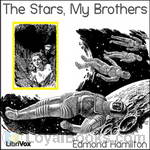 The Stars, My Brothers
The Stars, My Brothers
Edmond Hamilton (1904 – 1977) had a career that began as a regular and frequent contributor to Weird Tales magazine. The first hardcover publication of Science Fiction stories was a Hamilton compilation, and he and E.E. “Doc” Smith are credited with the creation of the Space Opera type of story. He worked for DC Comics authoring many stories for their Superman and Batman characters. Hamilton was also married to fellow author Leigh Brackett. – Published in the May, 1962 issue of Amazing Stories “The Stars, My Brothers” gives us a re-animated astronaut plucked from a century in the past and presented with an alien world where the line between humans and animals is blurred. | |
 The Man Who Saw the Future
The Man Who Saw the Future
| |
 The Sargasso of Space
The Sargasso of Space
| |
By: Edmund B. (Edmund Beecher) Wilson (1856-1939) | |
|---|---|
 Biology A lecture delivered at Columbia University in the series on Science, Philosophy and Art November 20, 1907
Biology A lecture delivered at Columbia University in the series on Science, Philosophy and Art November 20, 1907
| |
By: Edmund Burke (1729-1797) | |
|---|---|
 The Works of the Right Honourable Edmund Burke, Vol. 09 (of 12)
The Works of the Right Honourable Edmund Burke, Vol. 09 (of 12)
| |
By: Edmund Christopherson (1903-1974) | |
|---|---|
 Night The Mountain Fell; The Story Of The Montana-Yellowstone Earthquake
Night The Mountain Fell; The Story Of The Montana-Yellowstone Earthquake
A severe earthquake, centered in the vacation area of West Yellowstone, Montana, shook the ground and its inhabitants and visitors on August 17, 1959, at 11.37 pm. A mountainside fell, a lake formed, roads and houses disappeared, people were trapped, people died. The author of this narrative went to the area the day after the quake, took first-hand stories of the catastrophe, researched in the following months, and wrote this account within a year of the shaking. The printed source has many informative photographs. - Summary by David Wales | |
By: Edmund Deane (1582?-1640) | |
|---|---|
 Spadacrene Anglica The English Spa Fountain
Spadacrene Anglica The English Spa Fountain
| |
By: Edmund H. Leftwich | |
|---|---|
 The Bell Tone
The Bell Tone
| |
By: Edward Bellamy (1850-1898) | |
|---|---|
 Looking Backward: 2000-1887
Looking Backward: 2000-1887
Looking Backward: 2000-1887 is a utopian novel by Edward Bellamy, first published in 1888. It was the third largest bestseller of its time, after Uncle Tom’s Cabin and Ben-Hur: A Tale of the Christ.The book tells the story of Julian West, a young American who, towards the end of the 19th century, falls into a deep, hypnosis-induced sleep and wakes up more than a century later. He finds himself in the same location (Boston, Massachusetts) but in a totally changed world: It is the year 2000 and, while he was sleeping, the U... | |
 Looking Backward 2000-1887
Looking Backward 2000-1887
| |
By: Edward Elmer Smith (1890-1965) | |
|---|---|
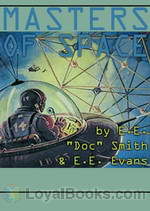 Masters of Space
Masters of Space
The Masters had ruled all space with an unconquerable iron fist. But the Masters were gone. And this new, young race who came now to take their place–could they hope to defeat the ancient Enemy of All? | |
By: Edward G. Robles | |
|---|---|
 See?
See?
| |
By: Edward George Bulwer-Lytton (1803-1873) | |
|---|---|
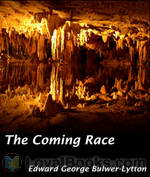 The Coming Race
The Coming Race
Edward George Earle Lytton Bulwer-Lytton, 1st Baron Lytton (1803-1873) was an English novelist, poet, playright, and politician. Lord Lytton was a florid, popular writer of his day, who coined such phrases as “the great unwashed”, “pursuit of the almighty dollar”, “the pen is mightier than the sword”, and the infamous incipit “It was a dark and stormy night.” Despite his popularity in his heyday, today his name is known as a byword for bad writing. San Jose State University holds... | |
By: Edward Hooker Dewey (1837?-1904) | |
|---|---|
 The No Breakfast Plan and the Fasting-Cure
The No Breakfast Plan and the Fasting-Cure
| |
By: Edward J. Ruppelt (1923-1960) | |
|---|---|
 The Report on Unidentified Flying Objects
The Report on Unidentified Flying Objects
'Straight from the horse's mouth', as they say. Edward Ruppelt was the first head of the U.S. Air Force's Project Blue Book, the official project initiated to investigate UFO reports beginning in 1952. This report from 1956 takes us inside these initial investigations, separates fact from fiction, and gives insight into who, when, where, and how sightings were reported and researched in open-minded fashion (for which Ruppelt was renowned), rather than in the typical hushed and secretive (and censored) manner most often associated with government and military reports which are released to the public... | |
By: Edward Jesse (1780-1868) | |
|---|---|
 Anecdotes of Dogs
Anecdotes of Dogs
"Histories are more full of examples of the fidelity of dogs than of friends."The character, sensibilities, and intellectual faculties of animals have always been a favourite study, and they are, perhaps, more strongly developed in the dog than in any other quadruped, from the circumstance of his being the constant companion of man. I am aware how much has been written on this subject, but having accumulated many original and interesting anecdotes of this faithful animal, I have attempted to enlarge the general stock of information respecting it... | |
By: Edward King (1735?-1807) | |
|---|---|
 Remarks Concerning Stones Said to Have Fallen from the Clouds, Both in These Days, and in Antient Times
Remarks Concerning Stones Said to Have Fallen from the Clouds, Both in These Days, and in Antient Times
| |
By: Edward Morton | |
|---|---|
 Remarks on the Subject of Lactation
Remarks on the Subject of Lactation
| |
By: Edward Singleton Holden (1846-1914) | |
|---|---|
 Sir William Herschel: His Life and Works
Sir William Herschel: His Life and Works
| |
By: Edward V. Lucas (1868-1938) | |
|---|---|
 The War of the Wenuses
The War of the Wenuses
| |
By: Edwin A. Battison | |
|---|---|
 The Auburndale Watch Company First American Attempt Toward the Dollar Watch
The Auburndale Watch Company First American Attempt Toward the Dollar Watch
| |
By: Edwin Abbott Abbott (1838-1926) | |
|---|---|
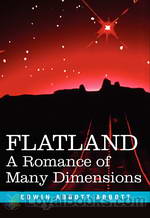 Flatland: A Romance of Many Dimensions
Flatland: A Romance of Many Dimensions
If you've never heard the term “Mathematical Fiction” before, Edwin Abbott Abbott's 1884 novella, Flatland can certainly enlighten you! Flatland: A Romance of Many Dimensions was published in 1884 and since then, it has been discovered and re-discovered by succeeding generations who have been delighted by its unique view of society and people. The plot opens with a description of the fictional Flatland. The narrator calls himself “Square” and asks readers to “Imagine a vast sheet of paper on which straight Lines, Squares, Triangles, Pentagons, Hexagons and other figures, instead of remaining fixed in their places, move freely about... | |
 Flatland: a romance of many dimensions (Illustrated)
Flatland: a romance of many dimensions (Illustrated)
| |
By: Edwin E. Slosson | |
|---|---|
 Creative Chemistry
Creative Chemistry
Slosson reviews the transformation of alchemistry from an obscure and imprecise practice to the science of chemistry. Along the way, he explains how the modern industrial world now relies on fertilizers, explosives, textile materials, polymers and metals.By exploring the properties of a once undervalued element, the high strength of vanadium steel made the Ford car possible. Another element, cerium, appears in butane lighters and was once seen as a threat to the match industry in France.In his chapter on oils, Slosson reviews the development of hydrogenated oils, especially during WWII, in the search for a way to reuse otherwise discarded components of corn and cottonseed... | |
By: Edwin Gifford Lamb (1878-) | |
|---|---|
 The Social Work of the Salvation Army
The Social Work of the Salvation Army
| |
By: Edwin K. Sloat (1895-1986) | |
|---|---|
 The Space Rover
The Space Rover
| |
 Loot of the Void
Loot of the Void
| |
By: Edwin L. Arnold | |
|---|---|
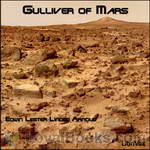 Gulliver of Mars
Gulliver of Mars
This escapist novel, first published in 1905 as Lieutenant Gullivar Jones: His Vacation, follows the exploits of American Navy Lieutenant Gulliver Jones, a bold, if slightly hapless, hero who is magically transported to Mars; where he almost outwits his enemies, almost gets the girl, and almost saves the day. Somewhat of a literary and chronological bridge between H.G. Wells and Edgar Rice Burroughs, Jones’ adventures provide an evocative mix of satire and sword-and-planet adventure. | |
By: Edwin Sharpe Grew (1867-1950) | |
|---|---|
 Romance of Modern Geology
Romance of Modern Geology
From the series, The Library of Romance, this book introduces the reader to the modern geology of the 1909, with topics that include the building and shaping of the earth, the action of weather, rivers, seas and ice on the earth, earthquakes and volcanoes, and, of course, dinosaurs and other extinct animals. - Summary by Ann Boulais | |
By: Elaine Wilber | |
|---|---|
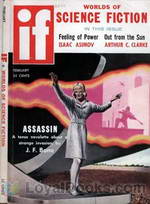 The Hero
The Hero
| |
By: Electronic Frontier Foundation | |
|---|---|
 Big Dummy's Guide to the Internet
Big Dummy's Guide to the Internet
| |
By: Elihu Burritt (1810-1879) | |
|---|---|
 A Journal of a Visit of Three Days to Skibbereen, and its Neighbourhood
A Journal of a Visit of Three Days to Skibbereen, and its Neighbourhood
| |
By: Elinor Glyn (1864-1943) | |
|---|---|
 Three Things
Three Things
| |
By: Elisha Gray (1835-1901) | |
|---|---|
 Nature's Miracles: Familiar Talks on Science
Nature's Miracles: Familiar Talks on Science
Elisha Gray (August 2, 1835 – January 21, 1901) was an American electrical engineer who co-founded the Western Electric Manufacturing Company. Gray is best known for his development of a telephone prototype in 1876 in Highland Park, Illinois and is considered by some writers to be the true inventor of the variable resistance telephone, despite losing out to Alexander Graham Bell for the telephone patent. | |
By: Eliza Lee Cabot Follen (1787-1860) | |
|---|---|
 Conscience
Conscience
| |
By: Elizabeth Blackwell (1821-1910) | |
|---|---|
 Pioneer Work in Opening the Medical Profession to Women
Pioneer Work in Opening the Medical Profession to Women
A fascinating account of the first woman to receive a medical degree in the United States. She writes of her struggles in being accepted to a medical school . She details her experiences while in the process of obtaining her degree, and her work both with patients and administratively, helping to found medical schools and hospitals for women. Summary by Phyllis Vincelli | |
By: Elizabeth Grinnell (1851-1935) | |
|---|---|
 Our Feathered Friends
Our Feathered Friends
This volume displays the romance of birds in beautiful prose and dialog in simple language for children and adults alike. Written by a mother and son team of naturalists, chapters describe various aspects of the life and habits of birds highlighting specific birds from owls to hummingbirds. From the introduction: “Seek the children, little book: Bid them love the bird's retreat . . . Bid them find their secrets out, How to understand their words.” - Summary by Larry Wilson | |
By: Elizabeth Lynn Linton (1822-1898) | |
|---|---|
 Modern Women and What is Said of Them A Reprint of A Series of Articles in the Saturday Review (1868)
Modern Women and What is Said of Them A Reprint of A Series of Articles in the Saturday Review (1868)
| |
By: Elizabeth Towne | |
|---|---|
 Happiness and Marriage
Happiness and Marriage
| |
By: Ella Rodman Church (1831-) | |
|---|---|
 Among the Trees at Elmridge
Among the Trees at Elmridge
"On that bright spring afternoon when three happy, interested children went off to the woods with their governess to take their first lesson in the study of wild flowers, they saw also some other things which made a fresh series of "Elmridge Talks," and these things were found among the trees of the roadside and forest." | |
By: Ellen Churchill Semple | |
|---|---|
 Influences of Geographic Environment
Influences of Geographic Environment
INFLUENCES OF GEOGRAPHIC ENVIRONMENT ON THE BASIS OF RATZEL'S SYSTEM OF ANTHROPO-GEOGRAPHY BY ELLEN CHURCHILL SEMPLE PREFACE The present book, as originally planned over seven years ago, was to be a simplified paraphrase or restatement of the principles embodied in Friedrich Ratzel's _Anthropo-Geographie_. The German work is difficult reading even for Germans. To most English and American students of geographic environment it is a closed book, a treasure-house bolted and barred. Ratzel himself realized that any English form could not be a literal translation, but must be adapted to the Anglo-Celtic and especially to the Anglo-American mind... | |
By: Ellen Key (1849-1926) | |
|---|---|
 Woman Movement
Woman Movement
Ellen Key's 'The Woman movement' follows the development of the feminist movement striving towards a greater emancipation of women in the public sphere and overcoming the traditional perception of gendered activities. The Swedish feminist and this work combined with many more, served as a base for a lot of the 20th century feminist movements. | |
By: Ellen Newbold La Motte (1873-1961) | |
|---|---|
 The Opium Monopoly
The Opium Monopoly
| |
By: Ellsworth Douglass | |
|---|---|
 Pharaoh's Broker Being the Very Remarkable Experiences in Another World of Isidor Werner
Pharaoh's Broker Being the Very Remarkable Experiences in Another World of Isidor Werner
| |
By: Emil K. Urban | |
|---|---|
 Birds from Coahuila, Mexico
Birds from Coahuila, Mexico
| |
By: Emil Lucka (1877-1941) | |
|---|---|
 The Evolution of Love
The Evolution of Love
| |
By: Emile Coué (1857-1926) | |
|---|---|
 Self Mastery Through Conscious Autosuggestion
Self Mastery Through Conscious Autosuggestion
| |
By: Emma Goldman (1869-1940) | |
|---|---|
 Anarchism and Other Essays
Anarchism and Other Essays
Chicago, May 4, 1886. In the Haymarket region of the city, a peaceful Labor Day demonstration suddenly turns into a riot. The police intervene to maintain peace, but they soon use violence to quell the mob and a bomb is thrown, resulting in death and injuries to scores of people. In the widely publicized trial that followed, eight anarchists were condemned to death or life imprisonment, convicted of conspiracy, though none of them had actually thrown the bomb. A young Russian immigrant, Emma Goldman, had arrived just the previous year in the United States... | |
 Marriage and Love
Marriage and Love
| |
By: Emma Raymond Pitman | |
|---|---|
 Elizabeth Fry
Elizabeth Fry
| |
By: Emma Willard (1787-1870) | |
|---|---|
 Theory of Circulation by Respiration Synopsis of its Principles and History
Theory of Circulation by Respiration Synopsis of its Principles and History
| |
By: England) Knaresbrough Rail-Way Committee (Knaresborough | |
|---|---|
 Report of the Knaresbrough Rail-way Committee
Report of the Knaresbrough Rail-way Committee
| |
By: Enrico Ferri (1859-1929) | |
|---|---|
 The Positive School of Criminology Three Lectures Given at the University of Naples, Italy on April 22, 23 and 24, 1901
The Positive School of Criminology Three Lectures Given at the University of Naples, Italy on April 22, 23 and 24, 1901
| |